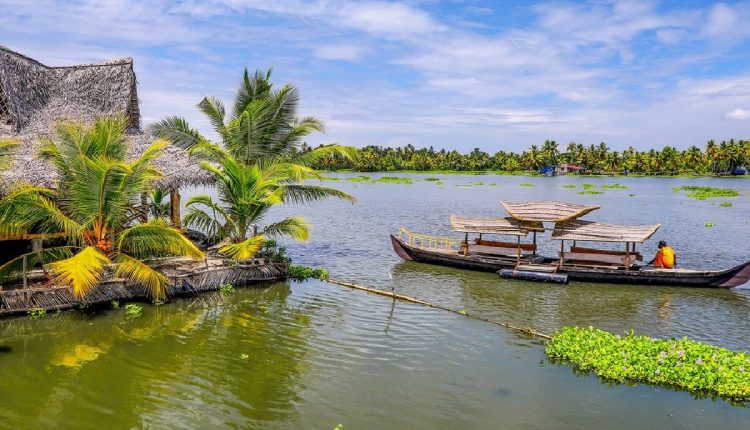Introduction: Where Nature Breathes Peace
Nestled on the banks of the serene Vembanad Lake, Kumarakom is a lush paradise located in Kerala’s Kottayam district. Known for its tranquil backwaters, houseboat cruises, rich biodiversity, and the famed Kumarakom Bird Sanctuary, this quaint village is a must-visit for travelers seeking peace, nature, and a taste of traditional Kerala life.
Whether you’re a nature enthusiast, a honeymooning couple, a solo traveler, or someone escaping the chaos of city life, Kumarakom offers you a haven of stillness and scenic beauty.
Houseboats on Vembanad Lake: Floating Bliss
One of the most iconic experiences in Kumarakom is a houseboat cruise through the backwaters of Vembanad Lake. These traditional kettuvallams are now luxurious floating cottages, complete with furnished bedrooms, living areas, and even private chefs.
What to Expect:
-
Breathtaking views of paddy fields, coconut groves, and village life
-
Local Kerala cuisine served fresh on the boat
-
Gentle, soothing journey across still waters, perfect for relaxation or romance
Pro Tip: Sunset cruises offer unforgettable views—perfect for photography or peaceful contemplation.
Kumarakom Bird Sanctuary: A Birdwatcher’s Paradise
Spread across 14 acres, the Kumarakom Bird Sanctuary is home to a diverse range of migratory and local birds. Early mornings are ideal for spotting species like:
-
Egrets
-
Herons
-
Siberian cranes
-
Kingfishers
-
Cuckoos
-
Owls
Walk along its green trails or take a canoe ride through the nearby waters for an immersive nature experience.
Village Life and Responsible Tourism
Kumarakom isn’t just about nature—it’s also about community. The Kumarakom Responsible Tourism Initiative allows visitors to engage with local life:
-
Visit coir-making units
-
Watch toddy tapping in action
-
Learn how to make local crafts
-
Enjoy a traditional Kerala meal in a villager’s home
This not only supports local livelihoods but also gives travelers authentic insights into Kerala’s culture.
Where to Stay: Comfort Amidst Nature
Kumarakom has accommodations for all budgets, from eco-lodges to ultra-luxury resorts. Popular options include:
-
Kumarakom Lake Resort – A five-star heritage experience with infinity pools and Ayurvedic spa
-
Coconut Lagoon by CGH Earth – Perfect blend of tradition and sustainability
-
Backwater Ripples – A mid-range lakeside resort with scenic views
Cuisine to Savor
Kerala’s cuisine is rich in spices, coconut, and local flavors. While in Kumarakom, don’t miss:
-
Karimeen pollichathu (Pearl spot fish cooked in banana leaf)
-
Nadan kozhi curry (spicy country chicken curry)
-
Fresh coconut water and banana chips
-
Kerala Sadya (vegetarian feast on a banana leaf)
Best Time to Visit
-
October to March: Pleasant weather and ideal for backwater cruises and birdwatching.
-
June to September: Monsoon adds a mystical charm to the region, with fewer tourists and lush green surroundings.
How to Reach
-
By Air: Nearest airport is Cochin International Airport (COK) – 80 km away.
-
By Train: Kottayam Railway Station – 16 km from Kumarakom.
-
By Road: Well-connected to Kochi, Alappuzha, and Thekkady by road and taxi.
Instagram-Worthy Spots
-
Sunset at Vembanad Lake
-
Houseboats docked along the banks
-
Birdwatching trails at the sanctuary
-
Village homes and coconut tree silhouettes
-
Hammocks in lakeside resorts
Final Thoughts: Where Time Slows Down
Kumarakom is more than just a travel destination—it’s an experience. It invites you to slow down, breathe deeply, and immerse in natural and cultural abundance. Whether you’re gliding on a houseboat or sipping chai by the lake, this backwater village will leave your soul refreshed and inspired.
Quick Summary
| Feature | Details |
|---|---|
| Location | Kottayam, Kerala |
| Highlights | Backwaters, Bird Sanctuary, Village Life |
| Ideal For | Nature lovers, couples, slow travelers |
| Best Time | October to March |
| Activities | Houseboats, Birdwatching, Cultural Walks |


Comments are closed.